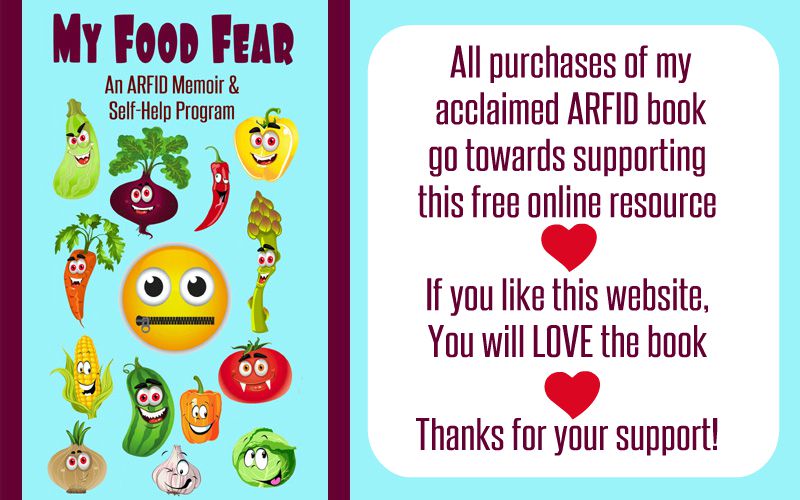Food phobia in children is widely experienced by kids and suffered by their parents! The vast majority of kids who are picky eaters will outgrow the habit and blossom into normal dining habits as they mature. However, some children will maintain their finicky eating into adulthood, while others will actually worsen with time.
Is food phobia reason for concern in a young person? How should parents handle food fear issues in their children? Should children be forced to eat? These are all questions that I receive regularly on this website. Of course, these are all very important considerations and shall be explored here in detail.
I began my descent into avoidant restrictive food intake disorder before my age of consciousness. My earliest memories at age 2 already had me eating very strangely and avoiding most foods. At age 4, I gave up my favorite foods to become a complete vegetarian. From then on, I only ate a handful of specific foods prepared a certain way for the next 33 years. I have since cured my avoidant restrictive food intake disorder and consider myself a very rare example of an adult who was able to overcome decades of accumulated damaging eating habits.
Types of Food Phobia in Children
By far, the most common type of food fear in kids is food neophobia. This means the fear of eating or even trying new foods. Kids tend to stick to what they like to eat and can find some foods very intimidating based on reputation, appearance, smell, presentation or other factor.
Some kids tend to avoid certain categories of food. These might include entire food groups (vegetables, meat, seafood), colors of food (green, red) or consistencies of food (sauces, soups) among other possible characteristics.
Children might prefer to eat food prepared by their family in favor of eating out at restaurants. Children might also shun food prepared by their family, or a specific family member, and this is often related to some type of psychoemotional trauma involving that person(s). Many children face fears of eating in an unfamiliar environment and might demonstrate hesitance, poor digestion or even sickness when forced to eat in a strange place.

Food Phobia in Children Consequences
I cover the consequences of avoidant restrictive food intake disorder in its own dedicated section. However, it is worth providing special consideration for the ways that ARFID can affect children, since they are so prone to mind and body influence during their formative years of development.
Physical effects of finicky eating are not often seen in children. Most kids will present quite normally when it comes to height and weight, energy level and cognitive abilities. Rarely, a child might have a nutritional deficiency or general malnutrition, low body weight, obesity or other physical consequence as a direct result of their picky eating habits.
Many children suffer psychoemotional trauma from their selective eating. I know for sure that I did! I knew that “something was wrong with me” from a very early age. I did not let it deter me in life, but the realization of being different (and not in a good way) was always present.
It is worth mentioning that psychological trauma is also the root cause of some eating disorders, like ARFID. While many cases are idiopathic, some can be traced to definitive causative mechanisms or events using various forms of therapy.
Social consequences are the most universally experienced by children with selective eating problems. Children do not like to feel different and isolated and this is exactly how ARFID makes them feel. I always felt like I did not belong in certain social settings where food was the focus. I also felt bad that when I was in attendance, the host would always have to make special considerations in order for me to eat anything at all! It made me feel guilty even when I was very young…
How to Handle Food Phobia in Children
There is much controversy about the right way to handle food fears in kids. Parents are afraid of doing the wrong thing and this often makes them try many different and often contrasting approaches, which does little good except to greatly confuse their affected child. Some parents try to force their children to eat, while others take the exact opposite approach and do not make a big deal out of food fears, hoping the child will work through it by themselves.
Taking a child to a doctor is a very common solution. This was what my own mother did on at least 2 notable occasions. In my case, these doctor visits did little except strengthen my resolve against eating and certainly proved just how clueless the pediatric medical community was about eating disorders a few decades ago… I talk more about my experience in My ARFID Story and discuss it in great detail in my humorous and extremely helpful, acclaimed book My Food Fear, if you want to know more.
Does your child need help and should they receive treatment for ARFID? Possibly. It really is on a case by case basis. Treatment is not always successful and can actually be traumatizing, especially when managed by a person who IS NOT QUALIFIED, such as a general pediatrician. All problematic cases of suspected avoidant restrictive food intake disorder in children should be evaluated by a qualified mental health professional who specializes in eating disorders.
As an aside, I strongly caution parents not to place their children on any type of drugs for dealing with an eating disorder. These interventions never address the root psychological cause and WILL ALWAYS cause damage to the anatomy. The off-label use of psychoactive drugs in some countries has reached epidemic levels and their application in innocent children is nothing short of criminal. You have been warned!

Leave a Reply
You must be logged in to post a comment.